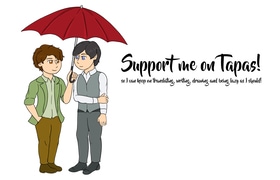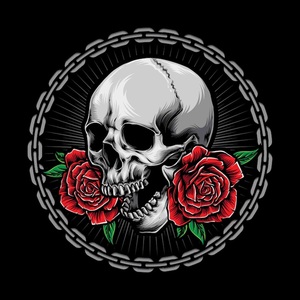"Don’t be in such a rush, we’ve got several hours of travel ahead," said Julien in an overly friendly tone. "Sit down, make yourself comfortable, and let’s talk about life."
Francis looked at him with suspicion—and rightly so. Who wouldn’t be wary of the very man they’d spent years exchanging barbs with in opinion articles?
Julien’s first reaction had been one of shock and indignation upon recognizing his rival. But, frankly, that anger dissipated as soon as he realized that Francis felt just as, if not more, embarrassed than he did. By now, all that remained was amusement at the situation.
“Look, I know we didn’t get off on the right foot,” Francis said, suddenly interested in coming across as conciliatory. “You have your way of expressing yourself, however romantic and fantastical it might be, and I have mine. There’s nothing wrong with that.”
“Oh? Then why did you start the feud by mentioning in one of your articles that a poet ‘whose name isn’t worth mentioning,’ but who writes for Le Progrès—and could only be me, of course—spends his days writing about utopias that have no place in the real world? Ah, what were your exact words? ‘A poet who has lost touch with reality, using fancy words to disguise mediocrity.’”
“Of course I said that! Our troops were in the middle of a war with Mexico, and we were losing! Surely there were better things to spend time on than writing a poem extolling the bravery of our soldiers. And before you protest—yes, perhaps their families might appreciate it, but isn’t that just romanticizing the cause they fought for? The campaign was doomed before it began. If only people had understood how absurd it was to support the Emperor of Austria…”
“That’s delving into politics, my friend. What the government and citizens might have done isn’t my concern when I’m writing my section. That’s your domain.”
“Right, because you’re not the one who addresses such matters in Le Progrès,” Francis murmured, blushing as Julien cut him off. Realizing his mistake, he knew better than to engage in a political debate with this man. That much was clear. “I suppose someone else does that.”
“Then what exactly bothers you so much about my essays? Is it the words I use to describe daily actions? I admit my editor sometimes scolds me for being overly flowery.”
“I don’t think it’s that—at least not enough to mention you in my own articles.”
“Could it be, then, the optimism in my texts? You strike me as a rather cynical person, so that would make sense.”
“Who says I’m cynical? You’ve just met me! You can’t say such a thing and act like it’s nothing.”
“Please. I’ve been reading your articles for years. How could I not know your modus operandi?” Julien scoffed, making it clear that it would be foolish to think he hadn’t been paying attention. “Know your enemy if you wish to fight them, after all. Although…” He paused for a moment. “I don’t really see you as an enemy. Not a skilled one, at least.”
“Don’t you? Well, I don’t know whether to feel flattered or insulted. I’m leaning toward the latter, seeing as you’ve just called me unskilled.”
“No, no, your articles are fine. I just mean that when you send fiery jabs my way, you’re like a child—crying a lot, but it’s impossible to figure out what you want from me.”
“I don’t want anything from you,” Francis retorted, perhaps a bit too quickly.
Was this supposed to be the “heated argument” their respective newspaper colleagues had imagined they’d have if they ever met face-to-face? Because it didn’t seem that way.
At least not to Julien. Francis, and the way his mind worked, remained a mystery. For Julien’s part, there wasn’t the slightest trace of anger. By now, he had returned to his initial relaxed posture, nibbling on his brioche and waiting for Francis’s reply as if this were a casual chat about some innocuous topic.
“Besides, don’t act innocent now,” Francis added. “Maybe I’ve made a couple of inappropriate comments in the press—”
“A couple hundred, more like.”
“—but you’ve been just as quick to respond in ways just as, if not more, offensive! Or are you going to deny that you once referred to me as a journalist incapable of appreciating the beauty of the universe? That you said, therefore, it was questionable whether my commentary on anything else was objective or just clouded by the same biases blinding me?”
“Oh yes, that was me,” Julien said, clearly delighted to be recognized. “What an honor that you remember my exact words after three years!”
Francis blushed again. Julien was beginning to notice he did that a lot when flustered.
“You’ve remembered mine too,” Francis replied, defensively as was becoming usual. “I couldn’t have maintained this feud for so long if you hadn’t kept fueling it.”
“But do you really see me as such? Honestly?”
“How else am I supposed to see you after all those insults, month after month?”
“I don’t know. I saw it as a healthy rivalry,” Julien admitted sincerely. “Maybe the first or second time you mentioned me, I was offended. But when I noticed how intensely you responded to what I said, I thought, ‘Let’s toss out an even bigger absurdity and see how he reacts.’ And let me tell you, you haven’t disappointed.”
Francis opened his mouth to deliver some sharp retort, but then closed it again without saying a word. Julien didn’t mind. He continued finishing his brioche with a couple more bites, his good humor still evident.
“Let me get this straight,” Francis said slowly, after nearly a minute of silent processing. “You’ve spent almost four years of your life speaking ill of me just for entertainment?”
“Well, with your usual bitterness and all, I did enjoy your political articles. Don’t make it sound like I buy Le Gaulois just to bother you specifically,” Julien replied. And he could have left it at that, letting peace reign. But of course, it was obvious he wasn’t going to miss the chance to add, “But yes, the bit about insulting you for fun is pretty accurate. I won’t deny that seeing you this unsettled satisfies me.”
“This…this is unheard of. If I’d known, I wouldn’t have wasted my time replying to you even once.”
“And reading.”
“Excuse me?”
“Don’t play dumb. We both know that, to be ready to respond as soon as I published something, you’ve had to buy Le Progrès regularly too,” Julien grinned as he confirmed. “And I’m glad to know that, possibly, after so much reading, something of my sensitivity has rubbed off on you. Who knows? Maybe today you’re not as blind to the beauty of the universe.”
It was evident that both Julien and Francis had been purchasing the latest editions of each other’s newspapers to keep track of what they were saying. But that didn’t mean Francis was ready to admit it—much less confess that perhaps a bit of Julien’s worldview had indeed influenced him.
And this became evident when Francis sighed, clearly tired of where this conversation was heading.
"Listen, forget it all, okay?" he offered. "Let's call a truce… or whatever you want to call it, since you don’t consider me an enemy. Let’s not talk about this anymore."
"How boring, just when things were getting interesting! I was probably this close to finding out the real reason why you started this fight!"
"Which stop are you getting off at?" Francis asked, completely ignoring that playful complaint.
"And how petty of you, now you're trying to throw me off the train?"
"I would if I could open this window—I wouldn’t even wait for the train to stop," he retorted, though Julien was almost certain he didn’t mean it. "No, I’m asking because I want to calculate how much longer I have to endure your bothersome presence."
"I’m getting off at Chambéry, since it’s my hometown and I planned to spend Christmas with my family." Noticing that Francis's expression shifted to something resembling a grin, he inquired, "What’s so amusing? Are you annoyed that I’ll soon disappear from your sight? You should really reorganize your priorities and decide whether you want to see me or not."
"I’m also going to Chambéry." The solemnity of this statement caught Julien off guard.
"For work, perhaps?"
"No, I’m also staying to spend the holidays with my family. I won’t return to Paris until after New Year’s."
"Impossible! I also have a ticket to return to Lyon after the New Year! What if it’s for the same date as yours? Not only will we share this trip, but the whole week and the return journey as well."
"Over my dead body! The truce only lasts until we arrive in Chambéry. Just because we live in the same town doesn’t mean we have to spend all of Christmas in each other’s company."
"Extend that truce throughout our stay in Chambéry, even if we don’t see each other. I don’t feel like arguing with you in front of my mother."
To be honest, Julien didn’t feel like arguing with anyone, least of all Francis, under any circumstances. But avoiding conflict in a family setting was such a reasonable suggestion that even someone as rigid as Francis wouldn’t want to reject it.
"Fine," Francis said after taking a moment to think it over. "No fights or harsh words while we’re on vacation. Of course, I hope we won’t need to work too hard to stay cordial—because we’ll each go our separate ways as soon as we reach the station."
"You seem very eager to get rid of me, which I can’t quite understand—everyone who knows me would agree I’m a delightful person," Julien remarked, unbothered by the idea that there might be at least one person in the world who didn’t find him pleasant. "But fine, I’ll agree. No pointless quarrels, and we go our separate ways the moment there’s an escape route in sight. Now, while that door remains closed," he continued, pulling another brioche from his bag and tossing it to Francis, who had no choice but to catch it mid-air to avoid it splattering across the seats, "why don’t you tell me how it’s possible that, after all these years, I’m just now learning we’re from the same town?"
"It’s not so unusual," Francis muttered as he held the brioche, still undecided whether to eat it. "When I was a teenager, I had to move to Paris to continue my studies, and I’ve lived there ever since."
That made sense.
If Francis had spent much of his youth and all his adult life in Paris, returning to Chambéry only occasionally, it was natural that Julien had never noticed his presence and that they hadn’t met in person before. Moreover, there was only one school in their hometown. And, given that Francis was several years older than Julien, it also explained why they hadn’t crossed paths during their school days.
In any case, Julien was glad the stars had aligned today to bring about this meeting. And he showed it by forgetting entirely that delving deeper into a conversation with someone who had criticized him so often might not be the best idea.
Or rather, Julien talked, and Francis mostly listened, occasionally making brief contributions here and there. Not only did he lack the desire to chat, but he also seemed reluctant to share more than the little he had already revealed about his work or family situation.
Still, that didn’t discourage Julien, who spent a good forty minutes chattering away—not just about himself but about any topic that came to mind and seemed even remotely interesting for both of them. He made an effort to include Francis, who, by now, had decided to eat the brioche offered—perhaps to keep his mouth busy and avoid having to answer questions with more than a monosyllable. Julien also avoided any subjects that might cause Francis to clam up again.
Everything was perfect—or almost.
Because they hadn’t even made it halfway to Chambéry when, suddenly, the train began to slow down, eventually coming to a stop.












Comments (0)
See all